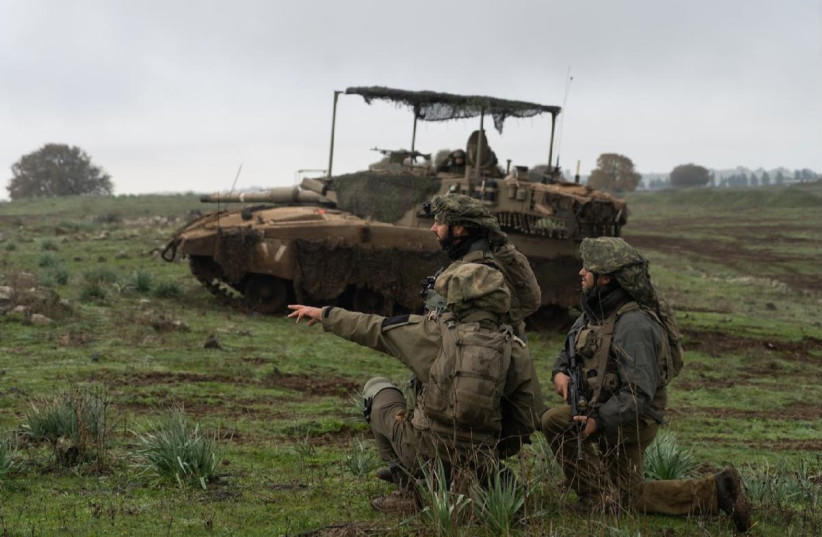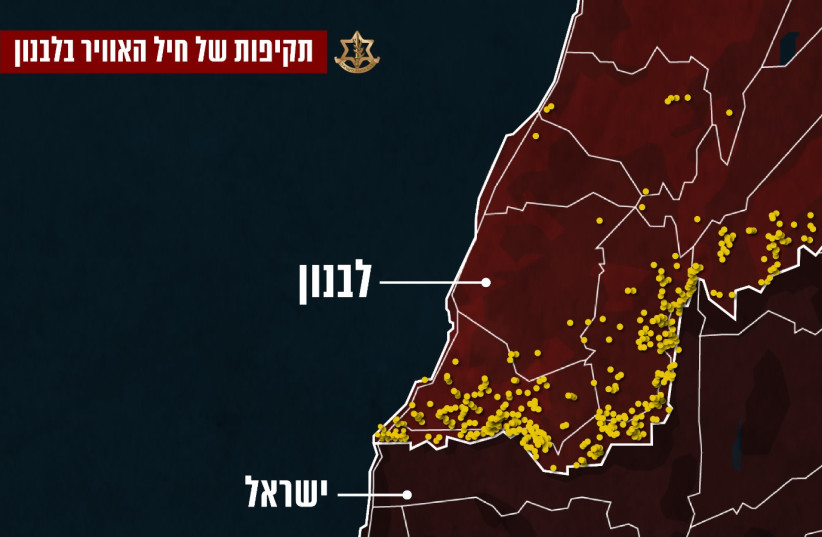‘War, now!’: Hezbollah fires over 100 rockets on Israel, IDF hits terror drone
Hezbollah fired over 100 rockets on Israel on Tuesday, while the IDF struck multiple strategic targets of the terror group around 100 kilometers deep into Lebanon in one of the most tense days of the conflict in the North.
Alarms sounded in the Galilee and the Golan Heights. The first round of rockets contained around 30 rockets, and the second round contained around 70.
Rocket crashes were reportedly sighted in open areas near Ein Kuniya, Snir, Sha’ar Yashuv, and Kfar Szold.
Hezbollah said it fired these Katyusha rockets in response to Israeli bombardment deep into Lebanon in the Bekaa region Monday night.
A mix of IDF statements, an analysis of the think tank ALMA, and other reports indicate that the IDF struck a Hezbollah drone base and a base where it held long-range rockets.

More specifically, the IDF implied that one of the bases it attacked had been the launching point for a drone attack on Israel on Monday.
Some of the IDF attacks deeper into Lebanon have followed drone attacks by Hezbollah, including its first attack on Baalbeck in February.
Hezbollah has seemed to want to use drones to deter more significant IDF attacks on its troops and assets as opposed to pure real-time self-defense attacks against its rocket-firing crews preparing to fire on Israel.
However, the IDF has seemed to want to deter Hezbollah from using drones to attack and still appears intent on deeper attacks on the terror group in order to force it to withdraw entirely from southern Lebanon.
At least one Hezbollah terrorist was killed, and several others were injured after Israel launched several strikes on Baalbek in eastern Lebanon, Reuters reported, citing two security sources and the Baakbek governor, Bashir Khader.
Security sources said one of the strikes hit the southern entrance of Baalbek, at least two kilometers from ancient Roman ruins. The three others struck near the city of Taraya, 20 kilometers west of Baalbek.
The IDF reported that fighter jets struck three launch posts that fired toward the Golan Heights.
Additional IDF attacks on Hezbollah on Tuesday included attacking rocket launch posts in Lebanon that had fired toward the North. A military compound in the Khiam area was struck, and terrorist infrastructure in the Bint Jbeil area was also struck on Tuesday.
Separately, the IDF announced on Tuesday that it had attacked Hezbollah around 4,500 times in Lebanon and Syria since the start of the war.
As part of those attacks, the IDF has killed over 300 Hezbollah terrorists as well as injured over 750 of them, though most of the attacks have been against the organization’s weapons and assets, such as nearly all of its border lookout posts.
In fact, the IDF said it had destroyed 150 lookout posts, which is dozens more than the number that was on the border, suggesting that its attacks truly have proceeded deeper into Lebanon.
These attacks have also cleaned out around 90% of the around 6,000 Radwan forces that Hezbollah had placed in southern Lebanon around October 7.
Also, the IDF said that around 50 platforms for more powerful rockets have been destroyed, and around 70 sub-command centers have been destroyed.
Breaking down the sources of attack, the IDF’s artillery and tank units have carried out more than 3,100 attacks, while the air force, whether fighter jets, drones, or helicopters, has carried out more than 1,200 attacks.
A graphic showed a flood of yellow circles all along the Israel-Lebanon border, signifying all of the spots where the IDF has attacked within Lebanon.

Besides general targets, the IDF has killed five senior Hezbollah commanders and has attacked dozens of cells that were preparing to fire on Israel with rockets or anti-tank missiles.
The IDF said it is constantly working on cleaning out the remaining Hezbollah Radwan forces from southern Lebanon as well as eliminating portions of its military leadership.
Further, the IDF said it recognizes the challenges of northern resident evacuees (over 50,000, down from 80,000) and expressed its commitment to establishing a new level of security and stability in the North.
A decision by the IDF to release its statistical achievements against Hezbollah in the middle of the month of March, as opposed to the end of a more concrete period of time, appeared to be an attempt to defray criticism of the IDF’s inability to halt Hezbollah’s rocket fire, especially on Tuesday.
The IDF did not provide an update on Hezbollah’s attacks on Israel, but based on past estimates put out by the IDF, Hezbollah has likely attacked Israel close to 5,000 times.
Despite the number of Hezbollah attacks, the number of Israelis dead from those attacks is in the low dozens since so many Israelis evacuated from the northern border in October.
IDF Northern Command Chief Maj, Gen. Uri Gordon, said that the attack machine that the IDF has run against Hezbollah is regularly achieving powerful results against the organization.
Itamar Ben-Gvir slams Gallant: ‘War, now!’
National Security Minister Itamar Ben-Gvir slammed Defense Minister Yoav Gallant on Tuesday after Hezbollah fired over a hundred rockets at Israel’s North, calling for a “war now” against the Lebanese terror organization.
“Gallant, the military is your responsibility. What are you waiting for?” Ben-Gvir said in a statement. “Over 100 rockets launched at the State of Israel, and you sit quietly? “We have to start responding, attacking – war, now!”
Gallant has repeatedly warned Hezbollah about escalating its conflict with Israel, claiming that “what Israel is doing in Gaza, we can do in Beirut.” Earlier this month, the defense minister stated, “We are committed to the diplomatic process. However, Hezbollah’s aggression is bringing us closer to a critical point in the decision-making regarding our military activities in Lebanon,” following a meeting with US Special Envoy Amos Hochstein.
Jerusalem Post Staff contributed to this report.





Comments are closed.